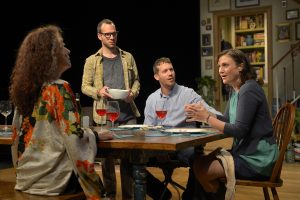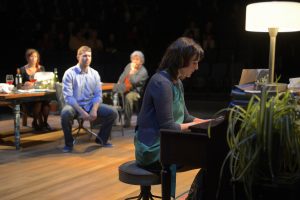At La Jolla Playhouse: A Family So Toxic That Deafness Can Be a Relief
Deafness, as we learned 33 years ago from Mark Medoff’s play Children of a Lesser God, is an intensely stratified and politicized handicap. Fully deaf people feel superior to the partial hearing. Lip-reading can be seen as pandering to a hearing world. American Sigh Language (ASL) may be the fourth most popular language in America. And so forth.
It’s all very hierarchical, says a character in Nina Raine’s play Tribes, now at the La Jolla Playhouse. And whichever combination of hearing and deaf parents and children is involved probably has a major effect on quality of life. For generations.
The family on display in Tribes is pretty much a train wreck but it’s not because of the deaf one, who obviously is the pick of the litter. Billy has grown up lip-reading and speaking, with no exposure to deaf society, and he appears to be his family’s strongest link to reality.
The father is a repulsive, bullying boor. The mother has figured out how to survive herself but she can do little for the children. The daughter is plain, wracked with self-doubts and rudderless. The younger brother is adrift in brackish academic waters and fighting psycho demons in his head. They rip and tear at each other, appearing to compete for cruelty points. It almost seems that Billy is saner than the rest because he’s been spared so much of the din.
There is a vague sense that this is to be seen as a literate, even cultured household of the sort that, in fiction anyway, produces “interesting” people. If that’s the idea, the evidence remains hidden from me. I detect no redeeming virtues in any of them, including the nice mom. So, when Billy reaches out to his real “tribe” at a deaf mixer and meets The Girl, the coming-to-dinner scene is to be dreaded.She’s a very nice girl, just right for him, but she’s touched with a melancholy of her own. The deafness that runs in her family is progressive. She’s already lost her music and she’s beginning to have trouble following spoken conversations. At least partly as a gesture of solidarity, Billy asks that she teach him to sign. And, when dinner with his family becomes the predictable disaster, it’s obvious he’ll soon be out of there.

Lee Roy Rogers, Thomas DellaMonica, Russell Harvard and Meghan O’Neill, left to right, in La Jolla Playhouse Tribes. Kevin Berna Photo
There’s an interesting subplot of Billy’s legal woes. Hired by attorneys, he translates videos of people talking that are then used as evidence in court and he stands accused of embellishing these. His answer seems to be that he translates not only the words spoken by moving lips but also their context. That’s the way, he says, that he’s grown up communicating.
This storyline is far more engrossing than pondering what will happen with that wretched family but, hey: The author makes choices.
Director David Cromer is not one for polish. Diction is sloppy, movement is random. There’s some sense that the play is set in England – talk of tea and pubs – but there’s little in the way of accent, artifact or behavior to confirm. Everybody just prances about and roars during the family scenes and more intimate moments inevitably feel misplaced on the quirked-up Mandell Weiss Forum stage. Too often, for a play that depends so much of seeing the actors’ hands and faces, the scenes between Billy and his Sylvia are hopelessly blocked for much of the audience.
Russell Harvard, a deaf actor who speaks well enough for the purposes here, plays Billy with a sure sense of how to keep the character (and the play) moving along. He has plenty left for the climaxes but his silences are articulate and loaded too. Meghan O’Neill makes Sylvia wistful and increasingly needy but able to function under pressure.
The words “Velcro children” are never spoken but that may be just because this dreadful father hasn’t the wit. His style is more crude physical jibes and rude baiting. So I guess Jeff Still is to be saluted, because I loathed him. Lee Roy Rogers makes the mom an appealing presence, suggesting that the character hasn’t a clue as to her own culpability in all this. Dina Thomas and Thomas DellaMonica do what they can with the devil’s spawn types they’re assigned.
Jeff Sugg is the creative champ of the show, with his savage, startling, evocative visuals that duplicate silently the uncomfortable sound design of Daniel Kluger. Sets, costumes and lighting (Scott Pask, Tristan Raines and Keith Parham, respectively) are as they should be.

Dina Thomas, Russell Harvard, Jeff Still and Meghan O’Neill, left to right, in La Jolla Playhouse Tribes. Kevin Berne Photo
I wish I liked the play better. There are moments that really linger: Sylvia, noticing the piano, asks, “Who plays?” Daddy answers, pompously, “We all do.” She sits down and tentatively picks out Debussy’s “Claire de Lune,” as if saying goodbye to each note.
But too many questions are raised and left unanswered. And too many good intentions are discarded too soon. Is deafness a prison or a liberation? Tell me more.
[box] Continues at 7:30 p.m. Tuesdays and Wednesdays; 8 p.m. Thursdays-Saturdays; 2 p.m. Saturdays and Sundas; and 7 p.m. Sundays through July 21, 2013.[/box]

Welton Jones has been following entertainment and the arts around for years, writing about them. Thirty-five of those years were spent at the UNION-TRIBUNE, the last decade was with SANDIEGO.COM.



Expectations for Tribes were set too high, by the culled reviews of London and New York productions and the convincing online interview with the author Nina Raine. In the event, the Playhouse production was very good (given the material), but the play itself came across as a draft work in progress. The themes were crudely conveyed and then undeveloped. The characters were caricatured stereotypes placed in violent collision with inadequate exploration of most sources of conflict. The numerous themes and troubled characters provide the kernel for several good literary works; instead, we have a single sophomoric hodgepodge.
Nonetheless, if I were faced with a similar choice again, I would attend such a play again. Of the six Playhouse productions this season, Tribes had the most potential for great theatre. But such potential is infrequently met and necessitates risk. One must attend a lot of Tribes to find one Iliad (a production that I attended twice last season in the same theatre), for example.
Your review was incisive, hitting many points for the author and the director to consider.
I especially enjoyed your line “She … tentatively picks out Debussy’s ‘Claire de Lune,’ as if saying goodbye to each note.” Thank you.